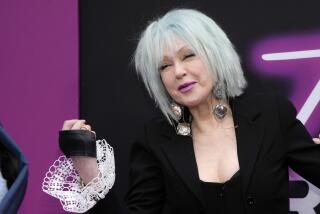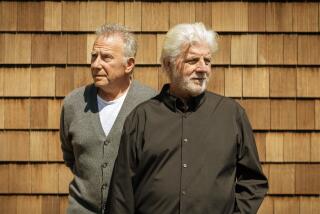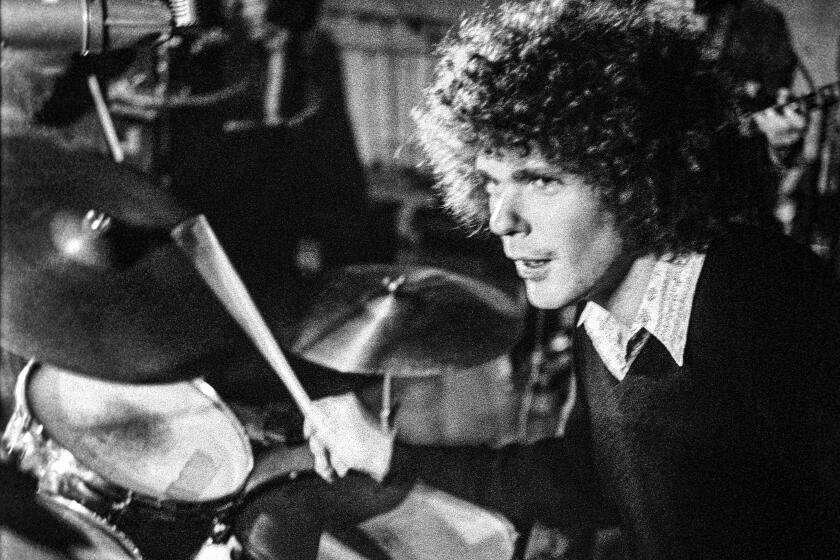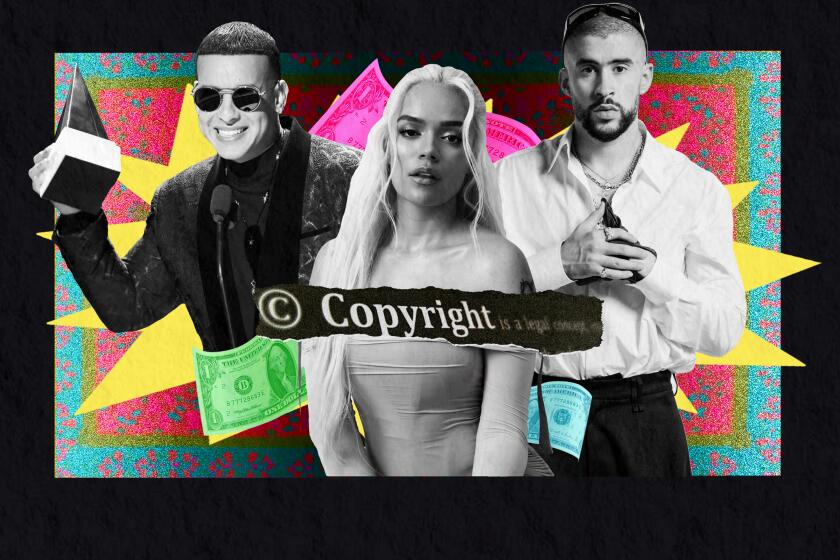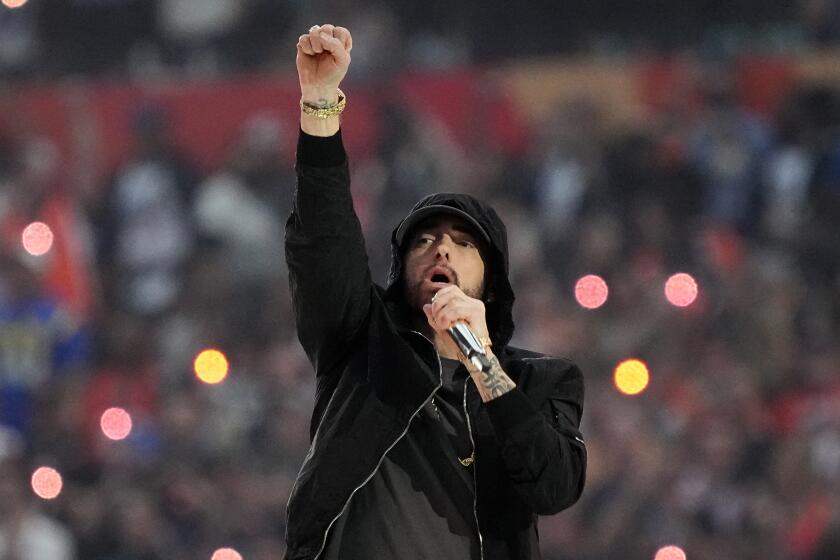POP MUSIC : Spinning in the Spotlight : Today’s dance music is full of beats and blips but often lacks such established delivery systems as traditional musicians. As a result, deejays are taking center stage. And you thought they just spun records.
The house is rocking, but the stage is empty on a Saturday night at the Dome.
Hundreds of excited eyes and death-grip fists aim the other way, at a booth that hangs high above the floor at this Hollywood Boulevard hot spot. That’s where Keoki, a slight man who wears spiked wristbands and enough silver to start his own pawnshop, plays his music.
The girls screech and the guys lose their heads in his sound. But he’s no Elvis.
He’s the deejay.
If electronic music is the future of pop, as some critics say, then the club deejay will likely be the star bringing it to you.
“Deejays aren’t just record players, they’re performers, and that’s being recognized on a larger scale,” says Michael Mannix, editor of Street Sound magazine.
What does a deejay do but play records?
It’s a matter of matching the beats, key and vibe of different vinyl using two turntables and a mixer. Good deejays, it is said, can “move the crowd” by speeding up the tempo, using bursts of silence and collating songs to produce nonstop sound.
“Deejays,” one record company scout insists, “are artists.”
*
The emerging worlds of ambient (New Age for a new generation), house (modern disco), techno (rapid-fire dance) and a dozen other derivatives (jungle, trip-hop, dub, et al.) necessitate the rise of the deejay-as-deliverer. These sounds often have few lyrics, bandleaders or even traditional musicians. It’s programmed and pressed on vinyl. And besides, performing material that consists of blips and bleeps live can appear quite awkward.
“Deejays are the public figures and the celebrities because the dance scene is so anti-artist-oriented,” says techno musician Moby, who deejays on the side. “You couldn’t name five people who make this music . . . so club fans associate their good time with the deejay.”
The sight of 27-year-old Keoki spinning records for hundreds of screaming kids at the Dome makes it look like the deejays are starting to take over. Sweat, adrenaline and pheromones ooze from the crowd as the New Yorker makes a choppy beat funky and a faint bass line chunky. A trance-inducing vibe wakes up and skyrockets to sonic climax, although it isn’t clear whether this is his work or just some record working its own magic at 45 r.p.m.
Keoki, small, dark and handsome, has all the eccentricities of a star (although he doesn’t seem to catch the symbolism of his upside-down Elvis belt buckle).
Born Keoki Maurice Franconi and of Hawaiian, Italian and Spanish ancestry, he was named for an island prince. He migrated to New York from his native Hawaii in 1986 and got his shot at the turntables when he was a busboy in a nightclub. After spinning records in the shadow of master deejays like Frankie Knuckles, Larry Levan and Frankie Bones, Keoki made his name playing the fast, spacey techno called “trance” on weeknights at the legendary Limelight.
At a friend’s West Hollywood bungalow before his L.A. show, he takes a hit of ecstasy (an illegal hallucinogen), tokes on a cross-shaped pipe filled with marijuana and tries to wrest a one-of-a-kind record from another deejay who’s visiting. Keoki’s still grappling with stardom.
“I just tell people, ‘I’m your humble servant,’ ” he says. “A pied piper.”
Far from a humble pastime, the male-dominated deejay industry is growing. Instead of begging Mom and Dad to buy them Les Paul guitars for their birthdays, many kids in Japan lust after a set of Technics turntables, notes author Karl Taro Greenfeld. In the United States, deejay shops often report shortages of the $550 Technics SL 1200 MKII--the deejay standard. And Technics says there are 6 million amateur deejays in America.
“Everyone wants to be a deejay,” says L.A. jock Jason Bentley.
They want to be like Keoki. His second deejay-mix album, “All Mixed Up,” on Moonshine Music, is coming out July 5, and he’s working on a new single, due in September. And during his recent gig at the Dome, groupies ask for his autograph.
Not everyone can rise to the level of club gigs, record contracts and production deals. In fact, like a generation of rocker wanna-bes before them, most deejays subsidize their $1,000-plus equipment and $10-a-pop records with day jobs.
“I think it’s still a bedroom sport,” says Todd Roberts, managing editor of Urb magazine.
Yet the deejay-as-star phenomenon, long a strong trend in Europe, is starting to take hold with fans stateside:
* The organizers of this summer’s Lollapalooza rock fest are planning a separate dance musicand deejay tour--to be called Enit --for select markets. Artists on their wish list include Moby, the Orb and Leftfield. The wish list of jocks includes Keoki, Germany’s Sven Vath and England’s Paul Oakenfold. None of the dates have been confirmed.
* Thousands of kids from San Diego to Greensboro, N.C., go to their local clubs to see such hot deejays as Orlando’s Kimball Collins and San Francisco’s Hardkiss collective on tour.
* And fans collect and trade illegal deejay “mix-tapes”--continuous mixes of other people’s music--like baseball cards, fueling an underground economy that surrounds dance music.
Mix-tapes are so popular that the Recording Industry Assn. of America, the industry trade group, is cracking down on deejays who make and sell them. Association lawyer Ellen Caldwell argues that mix-tapes make up a growing part of a bootleg industry that costs legitimate music companies an estimated $350 million a year.
L.A.’s Moonshine Music has done well peddling legal mix-tapes, selling 250,000 (many in CD format) since 1992. Moonshine brings in top jocks like Keoki, licenses the singles they want to use and then lets them melt the music together on turntables, club style. “We want to expose deejay culture,” says Moonshine owner Stephen Levy. Other labels, including Profile, FFRR and Thump, have followed suit.
Club deejays today also play a larger role inside the music industry--from their remixing of pop songs (by Prince, Janet Jackson and others) to their importance in breaking those same songs for the charts.
“The industry comes to us because we have a grip on what’s going on on the dance floor,” says remixer-to-the-stars David Morales.
But electronic dance music has yet to take hold in U.S. record stores. One out of five singles sold in the United States is an extended dance mix, industry sources report. “Dance music has basically been faceless,” says Mercury Records Vice President Bruce Carbone.
In Europe, deejays play stadiums, and electronic music dominates the charts. The deejay sound is heard in the success of such European pop acts as Bjork, Portishead and M People.
“The respect that a deejay is given in Europe is on the same level as a major pop star,” says English deejay DB, an artists-and-repertoire director for Profile Records in New York.
One barrier to dance music culture in the United States is its association with disco. The first deejays appeared in black gay clubs in the late ‘60s because, as Tom Smucker puts it in “The Rolling Stone Illustrated History of Rock & Roll,” “gay men couldn’t get live acts to perform for them.”
Those same deejays created disco by splicing beat-heavy sections of Philly soul records together. The sound went pop after the 1977 release of the film “Saturday Night Fever.” But a backlash ensued that was shrouded in homophobia, cultural detachment and ideological disdain. As Smucker notes in his essay, there was a concern that disco--with its emphasis on booty-shaking beats over revolutionary lyrics--”sounded a somber warning about the death of ‘60s youth culture idealism.” The backlash even had a slogan: “Disco sucks.”
“Ever since then we’ve had a hard time getting America to embrace it again,” says Profile’s DB. “The rave generation is the first since the disco generation that is really aware of dance music.”
L.A.’s Bentley, 24, also blames the major labels and commercial radio for being enmeshed in guitar culture.
“The rock ‘n’ roll industry is 40 years old and has made a lot of money for a lot of people with families and houses,” says the deejay, best known for his weeknight show, “Metropolis,” on KCRW-FM (89.9). “It’s no longer about gritty street music for them.”
Even in hip-hop, a sound created by deejays such as Kool Herc, Afrika Bambaataa and Grandmaster Flash, the rappers get more respect.
But as with punk rock’s late arrival here, dance music boosters say it is only a matter of time before deejay culture takes hold in the United States. “In America,” says London’s Mixmaster Morris, “you still have it all to happen.”
In Europe, the deejay revolution continues to evolve: CD mixing machines are beginning to replace turntables, mix-tapes are available on the Internet and virtual clubs can’t be far behind, Morris says.
Bentley says this all fits in just fine with the impending information revolution: Deejays are their own broadcast sites--like on-line bulletin boards--able to narrowcast to the whims of their audiences and give life to the diversity of new sound.
“I feel the music we support and play is the music of the next millennium,” he says. “It captures the intensity and energy of living in a new era.”
Back at the Dome, a gaggle of deejay groupies crowds around Keoki as he dances over his turntables, plastic handcuffs bobbing on the back of his belt. He tweaks the mixing board, adding bass here, treble there.
When his two-hour train ride comes to a stop, two girls ask if they can take his picture. A fan in blue Adidas sweats wipes Keoki’s wet face with a cosmetic pad. Keoki stands and faces the girls, points at the camera and, of course, sneers.
“He’s a superstar,” says fan Christi Brasher, 23. “He’s the king.”
More to Read
More to Read
More to Read
The biggest entertainment stories
Get our big stories about Hollywood, film, television, music, arts, culture and more right in your inbox as soon as they publish.
You may occasionally receive promotional content from the Los Angeles Times.

